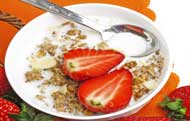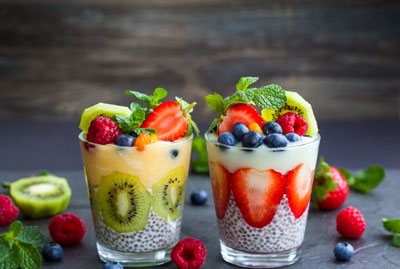





1. Strawberry Facts
2. Types of Strawberries
3. Nutritional Value of Strawberry
4. Health Benefits of Strawberry
The modern garden strawberry (Fragaria×ananassa) is a hybrid that originated in Europe in the 1750s from the accidental cross-pollination of two different species: the wild Virginia strawberry (Fragaria virginiana) from North America and the large-fruited Chilean strawberry (Fragariachiloenis chiloensis) from South America. While ancient Rome knew of wild strawberries and cultivated smaller varieties, the development of the large, familiar strawberry is a much more recent event.
History and Origin
The modern strawberry (FragariaXananassa) originated in Europe in the 18th century, resulting from a cross between the wild Virginia strawberry from North America and the Chilean strawberry from South America. Wild strawberries have a long history of use, with ancient Romans cultivating them for food and medicine.
Ancient times - Wild strawberries were gathered and used by various cultures, including ancient Romans who mentioned them in their writings. In the Americas, Native American tribes like the Iroquois also ate wild strawberries.
The modern hybrid - The large-fruited garden strawberry (Fragaria x ananassa) was accidentally created in Brittany, France, in the 1750s. This happened when French engineer Amédée-François Frézier brought the large, but not very hardy, Chilean strawberry to Europe, where it was accidentally cross-pollinated by the hardy Virginia strawberry.
Development of new varieties - The new hybrid was initially bred by Europeans, with the first American variety, the 'Hovey' strawberry, developed in Massachusetts in 1834. The 'Wilson' variety, developed in 1851, became more productive and hardy, helping to turn the strawberry into a major crop.
- • Alinta
- • Sundrench
- • Redlands Joy
- • Sweet Charlie
- • Lana
- • Tioga
- • Red Gauntlet
- • Cambridge Rival
- • Alpine strawberries
- • Mara des Bois
- • Hokowase
- • Sweetie
Australia grows and sells a variety of strawberries, including Australian-bred varieties suited for local climates like Alinta, Redlands Joy, and Sundrench, as well as popular older varieties such as Tioga and Red Gauntlet. Different types are suited for various regions, and some are sold for home gardens and others for commercial production.
Australian-bred varieties
Alinta: A disease-resistant variety that grows well in NSW and Victoria, producing medium-sized berries with great flavour.
Sundrench: A new variety with firm, large, deep-red fruit that ripens early and has good yields.
Redlands Joy: Bred to thrive in warmer conditions and be productive in Australian climates.
Sweet Charlie: A good choice for hot, subtropical Queensland, known for its large, glossy berries.
Lana: A day-neutral variety that fruits well in temperatures between 20 and 30C, making it suitable for tropical regions.
Other common and heirloom varieties
Tioga: A popular choice, especially for South Australia, that produces big, sweet berries.
Red Gauntlet: A tough, older variety that handles wet conditions well and is particularly suited for Tasmania's chill.
Cambridge Rival: A historic variety known for its excellent taste, which has been brought back by some nurseries.
Alpine strawberries: Smaller and often runner-free, these are great for pots and known for their high sugar levels and flavour.
Mara des Bois: A unique-tasting variety that can produce berries year-round and is a good choice for Victoria.
Hokowase: A large-fruited variety mentioned in forums for its good flavour.
Sweetie: Produces medium to large, bright red, bi-conical shaped fruit with high sugar levels.
Fruit ” Strawberry ” ( Nutritional value )
Nutritional value per 100 g
Strawberries, raw
|
Nutrient ( Proximate’s )
|
Unit
|
Value
|
Daily Value %
|
|
Energy
|
kcal
|
32
|
1.6%
|
|
Protein
|
g
|
0.67
|
1.3%
|
|
Total lipid (fat)
|
g
|
0.30
|
0.3%
|
|
Carbohydrate, by difference
|
g
|
7.68
|
2.7%
|
|
Fiber, total dietary
|
g
|
2.0
|
8%
|
|
Sugars, total
|
g
|
4.89
|
|
|
Minerals
|
|||
|
Calcium, Ca
|
mg
|
16
|
1.2%
|
|
Iron, Fe
|
mg
|
0.41
|
2.2%
|
|
Magnesium, Mg
|
mg
|
13
|
3%
|
|
Phosphorus, P
|
mg
|
24
|
1.9%
|
|
Potassium, K
|
mg
|
153
|
3.2%
|
|
Sodium, Na
|
mg
|
1
|
0.04%
|
|
Zinc, Zn
|
mg
|
0.14
|
1.2%
|
|
Copper, Cu
|
mg
|
0.048
|
5.3%
|
|
Manganese, Mn
|
mg
|
0.386
|
16.7.3%
|
|
Selenium, Se
|
mcg
|
0.4
|
0.7%
|
|
Fluoride, F
|
mcg
|
4.4
|
|
|
Vitamins
|
|||
|
Vitamin C, total ascorbic acid
|
mg
|
58.8
|
98%
|
|
Thiamin (B-1)
|
mg
|
0.024
|
2%
|
|
Riboflavin (B-2)
|
mg
|
0.022
|
1.6%
|
|
Niacin (B-3)
|
mg
|
0.386
|
2.4%
|
|
Pantothenic acid (B-5)
|
mg
|
0.125
|
12.5%
|
|
Vitamin B-6
|
mg
|
0.047
|
2.7%
|
|
Vitamin B-12
|
mg
|
0.00
|
|
|
Folate DFE (dietary folate) (B-9)
|
mcg
|
24
|
6%
|
|
Vitamin A, RAE (retinol)
|
mcg
|
1
|
0.1%
|
|
Vitamin E (alpha-tocopherol)
|
mg
|
0.29
|
0.9%
|
|
Vitamin D (D2 + D3)
|
mcg
|
0
|
|
|
Vitamin K (phylloquinone)
|
mcg
|
2.2
|
2.7%
|
|
Lipids
|
|||
|
Saturated Fatty Acids
|
g
|
0.015
|
0.07%
|
|
Monounsaturated Fatty Acids
|
g
|
0.043
|
|
|
Polyunsaturated Fatty Acids
|
g
|
0.155
|
|
|
Trans Fatty Acids
|
g
|
0.000
|
|
|
Carotenoids
|
|||
|
Beta-Carotene
|
mcg
|
7
|
|
|
Beta-Cryptoxanthin
|
mcg
|
0
|
|
|
Lutein + zeaxanthin
|
mcg
|
0
|
|

|
Reference Values are based on a 2,000 Calorie Intake, for Adults and Children 4 or More Years of Age. Your daily values may be higher or lower depending on your calorie needs.
|
|
Percentages are roughly approximated using (RDA) Recommended Dietary Allowances for adults. Source: USDA United States Department of Agriculture
|
|
Reference Values for Nutrition – FDA U.S. Food and Drug Administration
|
Strawberry Nutritional Value
Strawberries are packed with nutrients and offer several health benefits, including boosting heart health by lowering bad cholesterol and blood pressure, improving immune function through their high vitamin C content, and supporting digestive health with their fiber. They are also rich in antioxidants, which may protect against some cancers and age-related diseases like Alzheimer's and Parkinson's.
- BOOSTS IMMUNE SYSTEM
Strawberries boost the immune system because they are packed with vitamin C, which is essential for immune function. One cup of strawberries provides over 100% of the recommended daily intake of vitamin C and contains other beneficial nutrients like antioxidants, fiber, and folate that support overall health and a healthy immune response. - SUPPORTS BRAIN FUNCTION
Strawberries support brain function due to their high levels of antioxidants and other beneficial compounds, which help protect against cognitive decline and improve memory and attention. Research indicates that regular strawberry consumption can help slow age-related cognitive decline, improve processing speed, and reduce the risk of diseases like Alzheimer's. - CANCER-FIGHTING PROPERTIES
Strawberries contain anthocyanin, which is a potent anticancer antioxidant. Studies have also found that strawberries may be anti-inflammatory and anti-microbial. - HELP REDUCE INFLAMMATION
Strawberries help reduce inflammation due to their high content of antioxidants like vitamin C and polyphenols, including anthocyanins. These compounds safeguard cells from damage and systemic inflammation, and studies have shown they can lower inflammatory markers. Regular consumption may also improve endothelial function and show benefits for inflammatory conditions such as arthritis and inflammatory bowel disease (IBD).

- PROMOTES GUT HEALTH
Strawberries promote gut health by providing fiber and polyphenols, which act as prebiotics that fuel beneficial bacteria like Bifidobacterium. They can also help improve the gut microbiome's balance, reduce inflammation, and support regular bowel movements. - MANAGES BLOOD SUGAR
Strawberries can help manage blood sugar due to their fiber, antioxidants, and low glycaemic index, which help slow glucose digestion and reduce insulin spikes. Studies have shown that regular strawberry consumption can improve glycaemic control, insulin resistance, and other cardiometabolic markers in adults, particularly those with prediabetes. - SUPPORT CARDIOVASCULAR HEALTH
Strawberries support cardiovascular health by reducing inflammation and improving blood pressure, cholesterol, and antioxidant capacity. They contain beneficial compounds like anthocyanins and fiber, which help lower "bad" LDL cholesterol and improve blood vessel function. Regular consumption, even as little as one cup per day, can contribute to heart health. - GOOD FOR SKIN
Strawberries are good for your skin due to their high content of vitamin C, antioxidants, and natural acids, which can brighten, exfoliate, and fight acne. They help stimulate collagen production to reduce wrinkles, neutralize free radicals to protect against UV damage, and contain salicylic acid to unclog pores.
References
Nutrient Database – USDA (United States Department of Agriculture)
Reference Values for Nutrition – FDA U.S. Food and Drug Administration
Cardiovascular health - Strawberries support cardiovascular health by reducing inflammation and improving blood pressure, cholesterol, and antioxidant capacity. They contain beneficial compounds like anthocyanins and fiber, which help lower "bad" LDL cholesterol and improve blood vessel function. Regular consumption, even as little as one cup per day, can contribute to heart health.
Reduce inflammation - Strawberries help reduce inflammation due to their high content of antioxidants like vitamin C and polyphenols, including anthocyanins. These compounds safeguard cells from damage and systemic inflammation, and studies have shown they can lower inflammatory markers like C-reactive protein (CRP), IL-6, and IL-1β. Regular consumption may also improve endothelial function and show benefits for inflammatory conditions such as arthritis and inflammatory bowel disease (IBD).
Boosts immune system - Strawberries boost the immune system because they are packed with vitamin C, which is essential for immune function. One cup of strawberries provides over 100% of the recommended daily intake of vitamin C and contains other beneficial nutrients like antioxidants, fiber, and folate that support overall health and a healthy immune response.
Supports brain function - Strawberries support brain function due to their high levels of antioxidants and other beneficial compounds, which help protect against cognitive decline and improve memory and attention. Research indicates that regular strawberry consumption can help slow age-related cognitive decline, improve processing speed, and reduce the risk of diseases like Alzheimer's.
Promotes gut health - Strawberries promote gut health by providing fiber and polyphenols, which act as prebiotics that fuel beneficial bacteria like Bifidobacterium. They can also help improve the gut microbiome's balance, reduce inflammation, and support regular bowel movements.
Manages blood sugar - Strawberries can help manage blood sugar due to their fiber, antioxidants, and low glycaemic index, which help slow glucose digestion and reduce insulin spikes. Studies have shown that regular strawberry consumption can improve glycaemic control, insulin resistance, and other cardiometabolic markers in adults, particularly those with prediabetes.
Cancer-fighting properties - Strawberries contain anthocyanin, which is a potent anticancer antioxidant. Studies have also found that strawberries may be anti-inflammatory and anti-microbial.
Good for skin - Strawberries are good for your skin due to their high content of vitamin C, antioxidants, and natural acids, which can brighten, exfoliate, and fight acne. They help stimulate collagen production to reduce wrinkles, neutralize free radicals to protect against UV damage, and contain salicylic acid to unclog pores.
